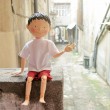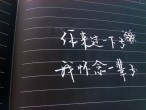
英文版励志作文初中【一】
兔子嘲笑乌龟的.步子爬的慢,但是他笑了,说总有一天他会和她赛跑,并且赢他。"快点",兔子说,"你很快会看到我是跑的多么的快。"他们打算马上就开始比赛。乌龟拼命的爬,一刻都不停止,兔子认为比赛太轻松了,他说他先打个盹,然后很快的可以追上乌龟。同时乌龟坚持爬行,当兔子醒来跑到的时候只能看着乌龟在他前面到达终点。稳扎稳打终能胜利。
英文版励志作文初中【二】
A hare jeered at a tortoise for the slowness of his pace .But he laughed ,and said that he would run against her and beat her any day she would name ."Come on ," said the hare ,"you will soon see what my feet are made of ."So it was agreed that they should start at once .The tortoise went off jogging along ,without a moment's stopping ,at his usual steady pace .The hare treating the whole matter very lightly ,said he would first take a little nap ,and that she should soon overtake the tortoise .Meanwhile ,the tortoise plodded on ,and the hare ,oversleeping herself ,arrived at the goal ,only to see that the tortoise had got in before her .
Slow and steady wins the race.
英文版励志作文初中【三】
Chinese immigrants struggle to hold onto their American dream after the husband's father (Xu Zhu comes for a visit from mainland China and gives a si-mp-le Chinese Medicine therapy called Gua Sha to his grandson.
Da Tong (Tony Leung Ka Fai is the father who is trying to integrate his Chinese cultural beliefs into his daily American reality, especially when dealing with his bo(Hollis Huston and best friend, who is too quick to believe the worst about Da Tong's treatment of his son, Dennis. Da Tong's failures show his confusion about the differences between his original Chinese culture and his new American home. Even within his family there is conflict because Grandfather can't speak English and is excluded from many conversations because Mother (Wenli Jiang wants only English spoken in her home for the benefit of her American born son. Da Tong and his wife are very well educated and understand that their child's best chances for succein America, and for him not to experience the same troubles they've had during the past 8 years, are to speak without an accent. They even go so far as to insist the boy use a fork and knife instead of chopsticks, even when it's obvious they are still eating Chinese style food, served in the normal way: communal dishes for the food and smaller, individual rice bowls for each person. Mother seems a bit inflexible in her insistence on being as American as possible, while Da Tong's cultural leanings are just as strongly Chinese, although not by conscious choice.
Da Tong's love for his son is tested severely when Da Tong tries to balance it against respect for his boss. When Da Tong's son hits his boss' son, Da Tong insists on an apology that seems unnecessary and makes Da Tong look stubborn and uncaring. Da Tong gives his boy a light rap on the head when he refuses to apologize and the boy cries to his mother that the reason he hit his playmate was that the other boy called Da Tong stupid, one of many examples of doing the wrong thing to protect your family.
The conflict arising from doing the wrong thing out of love or respect for one's family or closest friends continues throughout the movie, and every way Da Tong turns, he finds failure and encounters both obvious and subtle forms of anti-Chinese racism. Even Chinese folklore about the Monkey King, Sun Wu Kong, that Da Tong incorporates into a video game he designed is used to provoke his pride when he's vulnerable and fearing for the loof his son. Da Tong is misunderstood by everyone, family, friend, and foe, even though he has only the best intentions, and he carries the responsibility quite heavily, ma-ki-ng one wrong turn after another.
Gua Sha (The Treatment shows how a person's cultural beliefs are so deeply set within oneself that it is usually impossible to examine why you do most anything, from how you dreand talk to whom you love and respect and how you show it. The invisible nature of one's cultural beliefs also makes it difficult to impossible to explain yourself to others when questioned. Da Tong experiences an excruciatingly painful and difficult struggle while trying to protect his son, an ordeal that forces him to examine the validity of some of the most vital things he thought he knew about his identity, his Chinese culture, and the new American world he'd chosen as his home.
The movie showed me how normal it is for people to look for ways that their culture is superior to others' and how the misunderstandings arising from different cultural perspectives can seem very large, but can be nullified with si-mp-le, 2-sided explanations when people are willing to listen.
It appears this film is not readily available in the USA, but it's the best I've seen at highlighting the differences between American and Chinese culture. Parts of the movie's dialog are only in Chinese and I've yet to find a DVD with English subtitles, although it's easy to get the gist of what's going on during those short passages. The credits are a combination of Chinese and English, holding true to the integration of both worlds. I've noticed some important roles are not credited here on IMDb, such as Judge Horowitz, who was played by Alexander Barton。


















